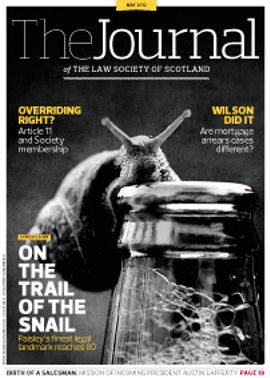Rights both ways

The recent decision by the Council of the Law Society of Scotland to abandon constitutional reform of the Society, concludes almost three years of Council attempts to have the membership adopt a new constitution. The Council should be concerned that it appears to be at odds with a large section of the membership over a document of such fundamental importance as its constitution.
However there is a more pressing issue for the Council of the Society to consider: why should solicitors be members of the Law Society of Scotland at all?
Section 2(1) of the Solicitors (Scotland) Act 1980 requires that “Every solicitor having in force a practising certificate shall be a member of the Society.” In short, as we all know, it is impossible to practise as a solicitor without a practising certificate issued by Council. And to obtain a practising certificate, one has to be a member of the Society.
Ground rules
Section 1 of the 1980 Act provides for the “objects” of the Law Society of Scotland to “include the promotion of the solicitors’ profession in Scotland and [the promotion of] the interests of the public in relation to that profession”. Therefore the Law Society of Scotland both regulates and represents solicitors (the so called “dual functions”). It does so in the knowledge that it is protected by the terms of the 1980 Act, compelling solicitors to be members of the Society. But in 2012, are these statutory provisions fair? Or, perhaps more precisely, are these provisions, which allow the Society to operate as a closed shop, without any regulatory alternative for solicitors, compliant with emerging European jurisprudence?
Article 11 of the European Convention on Human Rights (“ECHR”) states:
- “1. Everyone has the right to freedom of peaceful assembly and to freedom of association with others, including the right to form and to join trade unions for the protection of his interests.
- “2. No restrictions shall be placed on the exercise of these rights other than such as are prescribed by law and are necessary in a democratic society in the interests of national security or public safety, for the prevention of disorder or crime, for the protection of health or morals or for the protection of the rights and freedoms of others. This Article shall not prevent the imposition of lawful restrictions on the exercise of these rights by members of the armed forces, of the police or of the administration of the State.”
Article 15(1) of the Charter of Fundamental Rights of the European Union (“CFREU”) (2000/C 364/01) provides that: “Everyone has the right to engage in work and to pursue a freely chosen or accepted occupation”.
Positive and negative rights
The European Court of Human Rights (“ECtHR”) has been tasked with considering cases where legislative or administrative measures may compromise or inhibit this right. Most of the cases brought before the ECtHR have concerned employees’ rights to strike and the right to take “industrial action”. The term “association” in these types of cases is being applied “positively” in the context of upholding the individual’s right to join such action or collective agreements. (See Demir and Baykara v Turkey (2009) 48 EHRR 54, and Enerji Yapi-Yol Sen v Turkey [2009] ECtHR 68959/01 Third Section, 21 April 2009.)
By contrast, the ECtHR has repeatedly rejected challenges from both lawyers and doctors in relation to compulsory membership of their respective professional bodies. Such professionals wishing to exercise a “negative” right not to join a professional association have been unsuccessful because the ECtHR has taken the view that professional associations discharge an important public function in administering, regulating and disciplining their professional members. (See A and Others v Spain 66 DR 1990 (lawyers); Le Compt Van Looven and Demyre v Belgium (1982) 4 EHRR 1 (doctors); and Revert v France (1982) 62 DR 309 (architects).)
However, there is a significant caveat which should be noted: in these challenges the professional bodies concerned only regulated their members, and neither insisted on nor charged for combining the regulation with representation, as the Law Society of Scotland does.
The dual function factor
Indeed, when the negative right pertains to membership of an association or a body that represents, the ECtHR has held that forced membership is in breach of article 11: Sorenson and Rasmussen v Denmark [2006] ECtHR 52562/99, Grand Chamber. In this particular case, article 11 was held to have been breached where builders refused to join a trade union, with the consequence of denial of employment. It was this decision that prompted the Danish Law Society to end compulsory membership.
The difficulty the Law Society of Scotland would have were it faced with a challenge to its compulsory membership, would be the absence of ECtHR authority upholding compulsory membership of a professional members’ body or association which discharges “dual functions” of regulation and representation. Historically, the courts have allowed compulsory membership of professional associations because there is a public interest in disciplining and regulating professionals. However, when that function is combined with a representative function, which applies to solicitors only, the requirement for compulsory membership of such a body becomes open to fundamental question.
The issue of compulsory membership of the Law Society of Scotland becomes more vexed when it is considered that the Society is a regulatory monopoly. Solicitors have no choice which body should regulate them. By contrast, the Legal Services (Scotland) Act 2010 will allow those non-solicitors, seeking to provide legal services under an ABS model, to have a choice of regulator. This contradiction intensifies when it is realised that ABS entities will require neither to be represented nor regulated by the Society.
When considering competition law challenges, the European Court of Justice (“ECJ”) has displayed little sympathy for professional associations that compulsorily regulate in a market where there is no other choice. The Treaty on the Functioning of the European Union (formerly the Treaty of Rome) effectively outlaws practices by professional associations that are anti-competitive, even where there is a prima facie social or public function (Wouters v Algemene Raad van de Nederlandse Orde van Advocaten [2002] ECR I-1577).
Time to refocus
Indeed ECJ jurisprudence has been applied in a competition appeal tribunal case in the UK (Independent Insurance Brokers v Director General of Fair Trading, 17 September 2001), where the tribunal decided that the compulsion for insurance brokers to be members of the General Insurance Standards Council, in circumstances where the Council was the “sole regulator” (as the Society is for solicitors), “restricts or distorts competition in the provision of competing regulatory or certification services”. The tribunal proceeded to issue a judgment indicating that it was “reinforced in that view by the fact” that a broker is compelled to join and cannot leave without discontinuing in business. Although not mentioned in its decision, such a finding is consistent with article 15(1), CFREU (above). The analogy for Scottish solicitors is apparent.
The Office of Fair Trading (“the OFT”) is currently reviewing the regulation of legal services in Northern Ireland and Scotland. It is difficult to envisage it resisting an argument that allows a competitive regulatory market for solicitors. The argument that competing subscription charges could be passed off through cheaper fees for clients will be persuasive at the OFT. One hopes that the Council of the Society will consider these issues and perhaps realise that the time has come for solicitors to have a choice as to who represents them and who regulates them. If the Council instead chooses to retain its position as per the 1980 Act, then it may well be vulnerable to a judicial review. It would be open to any litigant to ask the court to “read down” the 1980 Act under s 3 of the Human Rights Act 1998 or seek a declarator from the court under s 4 of that Act. If either were successful, it would trigger the Scottish Government into addressing the 1980 Act’s incompatibility with the ECHR.
The Law Society of Scotland might be best advised to focus its constitutional reform on how it can continue to exist within the law.
In this issue
- Arguments in store
- Farming the constitution
- Willing to wound, yet afraid to strike?
- Deferred consideration – worth the paper?
- OSCR: the secondees' perspective
- To efficiency and beyond
- Reading for pleasure
- Opinion column: Fraser Tait
- Council profile
- Book reviews
- President's column
- Wind farms: a challenge to registration
- Snail of the century
- Rights both ways
- Sell, sell, sell
- RBS v Wilson: light in the tunnel?
- Take the heat out
- Prepare for case management
- Looking into the past
- Migrant days numbered
- CPI - the story so far
- Brighton declares
- Mary Mary quite contrary?
- How to avoid that Guarantee Fund interview, and worse...
- Law reform roundup
- Apportionment of price for SDLT
- Business checklist
- Practical guide to legal risks
- Ask Ash






